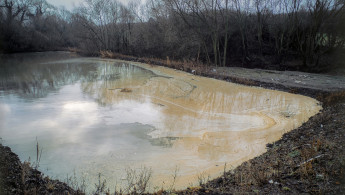Two children drown in Syria's Aleppo province
Two children drowned in a lake in the northern Syrian province Aleppo on Friday, the Syrian Civil Defence told The New Arab.
The humanitarian response group – also known as the White Helmets – say they transferred the bodies of Rahaf Abdul Qader al-Saleh, 13, and her cousin Hussein Hassan al-Saleh, 14, to Afrin city hospital after their bodies were found.
The children were both internally displaced as a result of the decade-long Syrian civil war which has forcibly displaced around 13 million civilians, fleeing Syrian regime, Russian and other militant factions’ bombardment.
Since the beginning of this year, at least 48 civilians in northwest Syria have drowned, according to the White Helmets.
“People are swimming without taking the necessary safety measures… most of the recorded drownings are of displaced people who are ignorant of the nature of these dangerous water bodies. Many times children are left to swim alone,” the response group told The New Arab.
Two children drowned in a lake in the northern countryside of #Aleppo today. Our teams pulled out their bodies and transferred them to Afrin city hospital.
— The White Helmets (@SyriaCivilDef) September 23, 2022
The death toll from drowning in Northwest #Syria has risen to 48 since the beginning of this year pic.twitter.com/dIEOZ2zKOU
In a similar incident, the body of a three-year-old child – who was missing for nine days – was found, and he was reported to have been in a well in the al-Bab area, the White Helmets said on Friday.
Accidents of this type, and drowning incidents, increase during summer as people usually visit rivers and lakes during hotter weather.
The White Helmets told The New Arab that the main bodies of water in the country’s north – including Lake Maidanki, the Euphrates River, the streams of Afrin, the Deir Ballut River, the Orontes River and Ain al-Zarqa – are extremely unsafe to swim in.
“All of these bodies are unsuitable for swimming and very dangerous even for an experienced swimmer or lifeguard.”
The response group – who say they raise awareness on such dangers and respond to water rescue operations - highlighted the importance of the family’s role in also educating their members to avoid such tragedies.





 Follow the Middle East's top stories in English at The New Arab on Google News
Follow the Middle East's top stories in English at The New Arab on Google News


